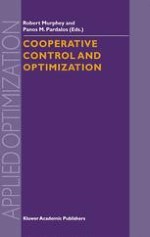2002 | OriginalPaper | Buchkapitel
Unmanned Aerial Vehicles: Autonomous Control Challenges, A Researcher’s Perspective
verfasst von : Bruce T. Clough
Erschienen in: Cooperative Control and Optimization
Verlag: Springer US
Enthalten in: Professional Book Archive
Aktivieren Sie unsere intelligente Suche, um passende Fachinhalte oder Patente zu finden.
Wählen Sie Textabschnitte aus um mit Künstlicher Intelligenz passenden Patente zu finden. powered by
Markieren Sie Textabschnitte, um KI-gestützt weitere passende Inhalte zu finden. powered by
AFRL is pressing ahead with development of truly autonomous UAV control systems. As we go from systems where the human is the pilot, through systems where the human is the operator, to systems where the human is the supervisor; with the ultimate goal simply to have the human as customer of UAV ops, we are running into numerous challenges. Yes, we face the typical technological questions of “What types of human tasks can we replace with on-board algorithms?” and “How big of a processor is required on-board to do this?”. What are usually not asked are other questions, maybe not technically exciting, but with enormous practical impact: “How can we affordably add more code to already costly flight critical s oftware programs?” “How do I flight certify a system that has non-deterministic attributes?” “What is the impact of implementing distributed, coordinated, info-centric control systems that now have flight critical data links susceptible to electronic and information warfare?” “How do I convince the FAA, and foreign governments, that it’s safe to let autonomous vehicles roam the skies?” These, and other questions, have just as great, if not greater, impact on systems development as the raw autonomous technology itself. This paper examines some of these challenges, how current AFRL research is addressing them, and points the way to future research that will allow truly autonomous operations.
